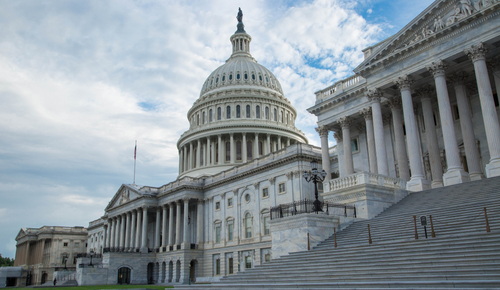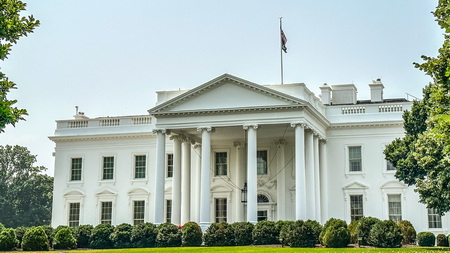President Biden met with congressional leaders this week to find a path forward on his $2.3 trillion infrastructure-focused American Jobs Plan. Republicans agreed to continue negotiations and develop a pared down counter-proposal that will limit the definition of infrastructure and include specific funding measures. (CNBC and Wall Street Journal, May 12 and The Hill, May 13)
Negotiations on Scope
- Biden’s multitrillion-dollar proposal calls for funding infrastructure investments by raising the corporate tax rate to 28% from 21% and making other changes to tax laws passed during the 2017 overhaul.
- “The proper price tag for what most of us think of as infrastructure is about $600 to $800 billion,” McConnell said on May 9. (CBS News, May 10 and Kentucky Educational Television, May 10)
- Biden and Vice President Kamala Harris on May 12 met with the “Big 4” Congressional Leaders – Republican Senate Minority Leader Mitch McConnell of Kentucky, House Minority Leader Kevin McCarthy of California, Democratic Senate Majority Leader Chuck Schumer of New York and House Speaker Nancy Pelosi of California – to discuss infrastructure proposals. Although both sides remained deeply divided over the scope of an infrastructure package and exactly how to pay for it, some optimistic signs emerged from the meeting. (New York Times, May 12)
- McConnell commented after the meeting, “We’re not interested in reopening the 2017 tax bill. We both made that clear with the president. That’s our red line.” (Business Insider, May 12)
- However, McCarthy added, “there is a place where we can find bipartisanship” – and Pelosi noted, “I feel very optimistic . . . about our ability to pass such a bill, more optimistic now about being able to do so in a bipartisan way. But we’ll see.” (Tax Notes, May 13)
Republican Counter-Offer

- Biden and Harris also met on May 13 to discuss infrastructure with a group of top Republican committee leaders, including Sen. Shelley Moore Capito of West Virginia, ranking member on the Senate Environment and Public Works Committee. (White House Readout of Oval Office Meeting, May 13)
- During the meeting, Republicans suggested using public-private partnerships to partially cover the costs of funding an infrastructure bill, instead of reversing elements of the 2017 tax bill. (The Hill, May 13)
- Capito commented after the meeting, “I think what he wants to see is ‘OK, I get it you don’t want me to touch the 2017 taxes … well then how are we going to pay for this.’ The [Paycheck Protection Program] was part of the discussion but there were other things discussed.”
- Capito added, “He asked that we would come back with another offer, with more granularity to it and more details, and so we agreed to do that. Maybe some different numbers too.” (The Hill, May 13)
- The president also met with key Democratic senators, including Joe Manchin of West Virginia and Kyrsten Sinema of Arizona, this week to discuss infrastructure measures proposals.
- Congressional Republicans are expected to propose their counter-offer for a pared-down infrastructure program next week.
Roundtable Statement
- Real Estate Roundtable President and CEO Jeffrey DeBoer on April 30 issued a statement on funding options for President Biden’s American Jobs Plan and American Families Plan.
- DeBoer noted, “As policymakers consider the options to raise this needed revenue, we strongly urge that the focus be on broad-based tax increases that do minimal damage to job creation, risk taking and entrepreneurial activity. Unfortunately, particularly when considered in total, many of the tax proposals accompanying the American Jobs Plan or American Families Plan would reduce economic activity, impede job growth, and diminish opportunities for startup businesses and those less advantaged. The current law in these areas may be in need of review and reform, but repealing these incentives is simply not wise.” (Full Roundtable statement)
The initial release of President Biden’s American Jobs Plan on March 31 listed several corporate tax revenue measures to offset infrastructure spending. Further details on the Administration’s proposed tax and revenue provisions are scheduled to be released on May 27 as part of the president’s FY 2022 budget proposal. (Reuters, May 13)
# # #








